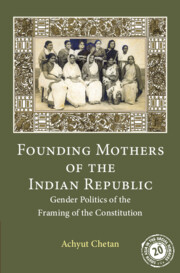Book contents
- Frontmatter
- Dedication
- Contents
- List of Images
- Preface
- Acknowledgements
- List of Abbreviations
- Introduction: Towards a Feminist Reading of the Making of the Constitution
- 1 In the Shadow of the Founding Fathers
- 2 In Search of the Missing Mothers
- 3 Women’s Moral Imaginary and Constitutional Politics: 1927–1946
- 4 Patterns of Participation: Women Members in the Constituent Assembly
- 5 Writing the Rights: Inscribing Constitutional Morality
- 6 Reformulating the ‘Woman Question’: Challenging Customs and Traditions
- 7 After the Framing
- Conclusion: Remembering the Founding Mothers
- Appendix: Texts and Contexts of the Framing – A Timeline
- Bibliography
- Index
6 - Reformulating the ‘Woman Question’: Challenging Customs and Traditions
Published online by Cambridge University Press: 27 September 2022
- Frontmatter
- Dedication
- Contents
- List of Images
- Preface
- Acknowledgements
- List of Abbreviations
- Introduction: Towards a Feminist Reading of the Making of the Constitution
- 1 In the Shadow of the Founding Fathers
- 2 In Search of the Missing Mothers
- 3 Women’s Moral Imaginary and Constitutional Politics: 1927–1946
- 4 Patterns of Participation: Women Members in the Constituent Assembly
- 5 Writing the Rights: Inscribing Constitutional Morality
- 6 Reformulating the ‘Woman Question’: Challenging Customs and Traditions
- 7 After the Framing
- Conclusion: Remembering the Founding Mothers
- Appendix: Texts and Contexts of the Framing – A Timeline
- Bibliography
- Index
Summary
To be without a code is, in my opinion, to be without justice.
—Durgabai Deshmukh, Constituent Assembly (Legislative) Debates, 1 March 1949At the moment of its emergence in colonial India, the woman question ‘was identified with a reified notion of culture that cast it narrowly as a “social problem”, and hence as the object of “social reform”’. Imperialist reformers used the woman question to counteract the force of ‘indigenous demands for political reform’ – pitting home against the public sphere. The nationalist patriarchal solution, which, according to Partha Chatterjee, emerged sometime around the end of the nineteenth century, resolved it by separating the two spheres of the home and the world. It was in the ‘home’, intimately contiguous with the ‘inner’ or ‘spiritual’ spheres of the nation that women were deigned to be located. It is evident that in both these approaches, the imperialist and the nationalist, the woman question was of subsidiary and instrumental interest to the agents of the discourse. At best it was an effect, a by-product of a larger re-imagining of the social world undergoing a transition towards modernity. These were representational discourses in which women had no significant roles to play, but were already constituted as fixed subjects, attributed with a given identity.
With the emergence of the women's movement in the twentieth century and the constitutional politics associated with it, these discourses were transformed into conflicts over the representation of women. Rather than remaining passive recipients of the identity imposed on them, women, among them our constitutional framers, staked claims to their self-definition, and determined the terms in which the woman question was raised. They did ‘unusual things’: ‘banding together, writing and petitioning for better health and childcare facilities, female education and maternal benefits, improved marriage and inheritance laws, suffrage’. They campaigned nationally and internationally for equal labour rights, for recognition of the economic value of domestic work, extended their demands to constitutional rights, envisioned a central role for women in a planned economy, and created a constituency of their own. In other words, women radicalized the content of the woman question. They defined it in their own terms.
To return to Chatterjee's template:
A renewal of the struggle for equality and freedom of women must, as with all democratic issues in countries like India, imply a struggle against the humanistic construct of ‘rights’ set up in Europe in the post-Enlightenment era and include within it a struggle against the false essentialisms of home/world, spiritual/material, feminine/masculine propagated by the nationalist ideology.
- Type
- Chapter
- Information
- Founding Mothers of the Indian RepublicGender Politics of the Framing of the Constitution, pp. 213 - 248Publisher: Cambridge University PressPrint publication year: 2023

